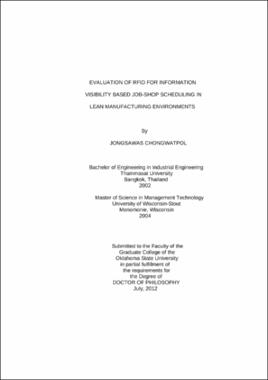| dc.contributor.advisor | Sharda, Ramesh | |
| dc.contributor.author | Chongwatpol, Jongsawas | |
| dc.date.accessioned | 2013-11-26T08:20:57Z | |
| dc.date.available | 2013-11-26T08:20:57Z | |
| dc.date.issued | 2012-07 | |
| dc.identifier.uri | https://hdl.handle.net/11244/6428 | |
| dc.description.abstract | Scope and Method of Study: This dissertation investigates the impact of radio frequency identification (RFID) in manufacturing. Two simulation studies of an organization that is considering implementing RFID on a production line are conducted. First, we investigate whether addition of RFID technologies in the manufacturing process can complement Lean initiatives. Specifically, will more accurate information from RFID-based solutions help in achieving the goals of Lean initiatives in manufacturing plant performance and, if yes, in what specific ways? Second, we examine how track and traceability through RFID can facilitate job shop production scheduling activities and under what settings such information visibility can add value to an organization. We propose and evaluate a novel information visibility-based dynamic scheduling rule that utilizes information generated from the real-time traceability systems for tracking work in processes (WIPs), parts and components, and raw materials to adjust production schedules. | |
| dc.description.abstract | Findings and Conclusions: Results of the discrete-event simulation suggest that employing RFID in Lean manufacturing initiatives can reduce some wastes but not necessarily all types of waste. Our results show that increasing information visibility reduces inventory, processing time, set-up time, waiting time, cycle time, and backlogs. However, we observe an increase in overproduction waste in our setting. Additionally, we test the performance of the proposed information visibility-based schedule rule against the classical scheduling rules such as FIFO and EDD rules. The results of the simulation suggest that RFID-based scheduling rule generates better performance compared to both FIFO and EDD rules with regard to cycle time, machine utilizations, backlogs, and penalty costs. We also note that the value of this information visibility is more relevant when disruptions and demand variations occur in the operations or when the capacity is tight in relation to demand. | |
| dc.format | application/pdf | |
| dc.language | en_US | |
| dc.rights | Copyright is held by the author who has granted the Oklahoma State University Library the non-exclusive right to share this material in its institutional repository. Contact Digital Library Services at lib-dls@okstate.edu or 405-744-9161 for the permission policy on the use, reproduction or distribution of this material. | |
| dc.title | Evaluation of RFID for information visibility based job-shop scheduling in Lean manufacturing environments | |
| dc.contributor.committeeMember | Wilson, Rick | |
| dc.contributor.committeeMember | Delen, Dursun | |
| dc.contributor.committeeMember | Hardgrave, Bill | |
| osu.filename | Chongwatpol_okstate_0664D_12154.pdf | |
| osu.accesstype | Open Access | |
| dc.type.genre | Dissertation | |
| dc.type.material | Text | |
| dc.subject.keywords | information | |
| dc.subject.keywords | lean | |
| dc.subject.keywords | manufacturing | |
| dc.subject.keywords | rfid | |
| dc.subject.keywords | scheduling | |
| dc.subject.keywords | visibility | |
| thesis.degree.discipline | Business Administration | |
| thesis.degree.grantor | Oklahoma State University | |
